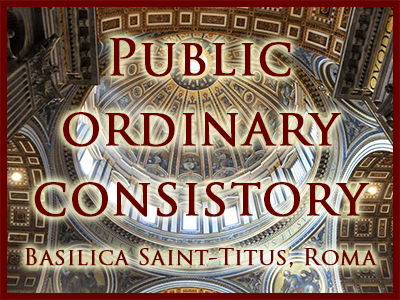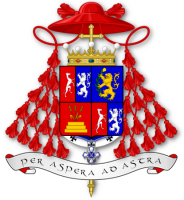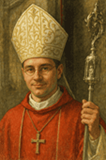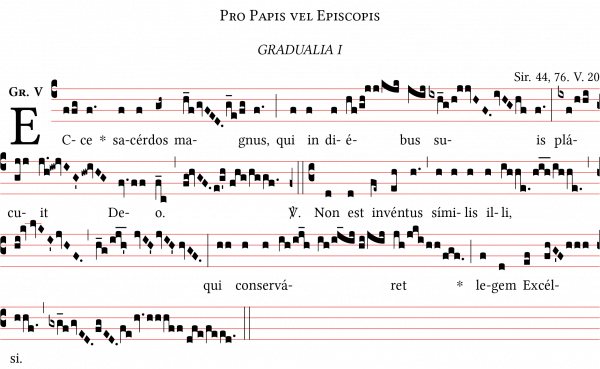 |
L'Eglise Aristotelicienne Romaine The Roman and Aristotelic Church
Forum RP de l'Eglise Aristotelicienne du jeu en ligne RR
Forum RP for the Aristotelic Church of the RK online game
 
|
| Voir le sujet précédent :: Voir le sujet suivant |
| Auteur |
Message |
Kalixtus
Cardinal


Inscrit le: 24 Fév 2013
Messages: 15961
Localisation: Roma, Palazzo Doria-Pamphilj
|
 Posté le: Ven Avr 18, 2025 2:06 pm Sujet du message: [RP] Public Ordinary Consistory 20/04/1473 Posté le: Ven Avr 18, 2025 2:06 pm Sujet du message: [RP] Public Ordinary Consistory 20/04/1473 |
 |
|

DDDDDDDDDDDD

Rome, in the early morning, when the mist still clings to the columns of the Eternal like the breath of an unseen liturgy...
Kalixtus stood motionless. Not from exhaustion. Not from contemplation. But from that rare inner stillness that arises when the soul beholds the sublime and becomes aware of its own insignificance—without being shattered by it.
Before him: St. Titus’ Basilica. Not merely a building—no. A memory. A heart of stone that beats for God. A confession of faith made flesh in marble, defiant against the dust of time.
“Here,” he whispered without moving his lips, “man has given form to the Invisible—and the Invisible has accepted it.”
The dome loomed over Rome like the first sky after the Flood. So vast that it did not merely receive the light of the sun—it seemed to transcend it. So perfect that even doubt was forced to kneel—not in reverence, but in helplessness.
Every column, every stone, every gilded inscription was to Kalixtus a verse in a living gospel of architecture. He could read them as in an ancient codex: the triumphal processions of angels, the tears of martyrs, the whisper of centuries. And above all, the majesty of God—not distant, but present. Incarnata in pietra.
And yet… it was not only God who dwelled here. St. Titus' was also a mirror. A crucible of the soul. None entered it and emerged unchanged. Kalixtus knew this. Beauty was dangerous. Grandeur, seductive. For it revealed how small man truly is—and yet to what heights he may rise, if he dedicates himself to God.
The Cardinal laid his hand upon the cool marble balustrade. The dove above the altar—cast in glass—burned in his gaze like a fire that would never be extinguished.
“So this is what the face of the Eternal looks like, when it is mirrored in the earth… Not as lightning, not as storm, but as basilica—silent, steadfast, unfathomable.”
In that moment, faith was renewed in him—not as duty, but as longing. Not as order, but as calling. St. Titus' was not yet complete—for every soul who entered completed it a little more.
And as the first rays of sun poured through the colonnades, golden as the blood of ancient saints, Kalixtus knew:
“We do not carry these walls—they carry us.”
_________________
 |
|
| Revenir en haut de page |
|
 |
Adonnis
Cardinal


Inscrit le: 19 Jan 2018
Messages: 5388
Localisation: Monte Real/Leiria - Palazzo Taverna/Roma
|
 Posté le: Mer Avr 23, 2025 8:26 pm Sujet du message: Posté le: Mer Avr 23, 2025 8:26 pm Sujet du message: |
 |
|
The ceremonial sound of the bells of the Basilica of Saint Titus echoed solemnly throughout the surroundings, announcing the opening of the Public Ordinary Consistory, the occasion on which the new members of the Sacred College of the Cardinals would take their oath to the Sovereign Pontiff and receive their biretta and their ring. As the clergy, nobles and faithful approached the Basilica, their voices were lowered in respect for the sacredness of the moment.
Suitably dressed, the Sagres climbed the steps towards the great portal, accompanied by his niece, the Marchioness of Vieira de Leiria and Baroness of San Giorgio di Pesado, who was staying at Palazzo Taverna, the Sagres Family's residence at the Holy Roman See.
After reaching the confessio, the Cardinal took one of the seats reserved for Cardinals and remained in silent prayer, awaiting the Holy Father's entrance and the solemn start of the Consistory.
_________________

.........Cardinal-Bishop of Saint Valentine of the Victories / Archichancellor of the Holy See / General Inquisitor of Portugal
.............Governor of Latium / Metropolitan Archbishop of Braga / Bishop of Vila Real and Ostia / Duke of Monte Real |
|
| Revenir en haut de page |
|
 |
Francesco_maria
Cardinal


Inscrit le: 14 Jan 2013
Messages: 4181
|
 Posté le: Mer Avr 23, 2025 9:19 pm Sujet du message: Posté le: Mer Avr 23, 2025 9:19 pm Sujet du message: |
 |
|
Intense days of prayer and solemn celebrations. Cardinal Sforza soon reached the sacristy to prepare for this rite to welcome new brother cardinals who for him in a special way had been authentic brothers with whom he had shared efforts, trials and reached new goals. Their testimony of faith shone in a particular way in his eyes because they were a faithful flame that resisted even in the storm of territories in which the Holy Aristotelian Church is not always well liked, yet another proof that fidelity to the True Faith, perseverance and love for the Holy Roman Aristotelian Church can overcome every obstacle.
_________________
 |
|
| Revenir en haut de page |
|
 |
Fenice
Cardinal


Inscrit le: 19 Déc 2010
Messages: 12383
|
 Posté le: Mer Avr 23, 2025 9:52 pm Sujet du message: Posté le: Mer Avr 23, 2025 9:52 pm Sujet du message: |
 |
|
Cardinal Fenice reached her assigned seat and, as she exchanged greetings with the other members of the Curia and prelates, she felt the tiredness from the intense days of close celebrations quickly fade away, replaced by gratitude for the new blood that was reinforcing the Sacred College.
Two new cardinals were joining the Curia in those very significant days.
She thought back to her own beginnings as a cardinal, to the countless times she had exchanged opinions and information and voted on decisions for the good of the entire Church.
It was an enormous responsibility and tiring work, but Faith and spirit of service were a formidable support.
_________________
 |
|
| Revenir en haut de page |
|
 |
Bibiano

Inscrit le: 30 Sep 2022
Messages: 126
|
 Posté le: Jeu Avr 24, 2025 1:36 am Sujet du message: Posté le: Jeu Avr 24, 2025 1:36 am Sujet du message: |
 |
|
Em profundo silêncio adentra ao recinto e toma seu lugar aguardando o início da cerimônia.
---
In deep silence, he entered the room and took his seat, waiting for the ceremony to begin.
_________________

• Conde de Ervedal • Capelão Régio • Arcebispo Metropolitano de Évora • |
|
| Revenir en haut de page |
|
 |
Cinead
Cardinal


Inscrit le: 17 Fév 2018
Messages: 1144
Localisation: Twynholm, Scotland
|
 Posté le: Jeu Avr 24, 2025 10:57 am Sujet du message: Posté le: Jeu Avr 24, 2025 10:57 am Sujet du message: |
 |
|
The Public Ordinary Consistory, it has been a while since Cinead has visited one. And now, this is a very special one because he is one of the people made Cardinal. What a joyous moment for this simple Scottish man, whom had not expected to receive this great honor bestowed upon him. So here he is, together with his English colleague and friend who is also part of this ceremony to be addressed by the Pope. Cineads thoughts are interrupted by the ceremonial sound of the bells of the Basilica of Saint Titus, he become a wee bit nervous and tries to relax and keep his breath under control. Luckily he seems some familiar faces of people that have always supported him, the calms him down a little and he sits down where he is supposed to be and waits for the ceremony to begin.
_________________

Chartulary of the British Islands, Bishop of Whithorn, Archivist for the Registers, Translator at Order of Saint Jerome, Theologian at the Holy Office 🏴 |
|
| Revenir en haut de page |
|
 |
Vanyar
Cardinal


Inscrit le: 28 Jan 2012
Messages: 951
|
 Posté le: Ven Avr 25, 2025 9:00 am Sujet du message: Posté le: Ven Avr 25, 2025 9:00 am Sujet du message: |
 |
|
Vanyar has been notified of his appointment to the College of Cardinals, where he is to be created Cardinal-Deacon at the next Public Ordinary Consistory within the Basilica of Saint Titus. The decision follows formal communication received from the Holy Curia, issued under the authority of His Holiness the Pope. The old Grey Friar has expressed his appreciation for the trust thus placed in him and has accepted the summons with characteristic reserve.
Though long accustomed to the administrative and pastoral burdens of Church life in the provinces, His Eminence acknowledges the symbolic weight of returning to Rome in this capacity. While no stranger to the workings of the Curia, he regards this appointment not as culmination, but as continued obligation—differing in scope, not in nature.
Preparations are being made for his arrival at the Basilica. He will present himself at the appointed hour, as directed. His thanks are extended to the Holy Curia and to His Holiness for this distinction. It is understood that His Eminence intends to discharge his future responsibilities with the same measured persistence that has marked his service thus far.
_________________

Presbyter & Bishop of the Universal and Roman-Aristotelian Church. | Bishop of Carlisle & Ptolemais |
|
| Revenir en haut de page |
|
 |
Adelene
Cardinal


Inscrit le: 08 Juil 2020
Messages: 2920
Localisation: Villa Catena
|
 Posté le: Ven Avr 25, 2025 9:36 am Sujet du message: Posté le: Ven Avr 25, 2025 9:36 am Sujet du message: |
 |
|
Quel étrange chemin que celui du Consistoire des cardinaux pour Adelène, qui venait d’adresser sa démission au Saint-Père. Quelle étrange occasion aussi, que celle de venir accueillir deux nouveaux frères tandis que deux autres rendaient les armes. Deux Anglais contre deux francophones : voilà le cycle de la vie en bonne santé, avec un sang qui tourne. Quoi qu’on en dise, tout cela était bon signe, et donnait à espérer des lendemains meilleurs.
Le printemps baignait Rome. Et ce n’était pas cette petite brume matinale qui allait couvrir d’ombre une cérémonie heureuse.
Adelène avait le cœur lourd, mais le pas léger. Il s’installa à la suite des autres cardinaux et se prêta volontiers à quelques discussions banales, souriant poliment aux anecdotes qu’on lui servait.
___
What a strange path to the Consistory of Cardinals for Adelene, who had just submitted her resignation to the Holy Father. What a strange occasion, too, to welcome two new brothers while two others gave up their arms. Two Englishmen against two Frenchmen: that's the cycle of life in good health, with the blood flowing. Whatever one might say, all this was a good sign, and gave hope for a better tomorrow.
Spring was in Rome. And this morning mist was not going to cast a shadow over a happy ceremony.
Adelene's heart was heavy, but his step light. He took a seat with the other cardinals and happily lent himself to a few banal discussions, smiling politely at the anecdotes he was told.
_________________

Son Éminence Adelène de Kermabon - Cardinal de Saint Nicomaque de l'Esquilin - Archevêque de Bordeaux |
|
| Revenir en haut de page |
|
 |
Ettore_Asburgo_D'Argovia
Cardinal


Inscrit le: 28 Nov 2018
Messages: 1976
Localisation: L'Aquila
|
 Posté le: Dim Avr 27, 2025 12:13 am Sujet du message: Posté le: Dim Avr 27, 2025 12:13 am Sujet du message: |
 |
|
His Eminence, Ettore Asburgo d'Argovia, had been informed that he would be required to swear an oath before the Holy Father, a privilege he welcomed with profound joy. Participating in the sacred rites of the Church was not merely a way to strengthen his bond with the Community of Saints, but also an opportunity to immerse himself in the ethereal grace of the high clergy, whose composure and elegance were befitting his rank. Yet such dignity still eluded the Venetian Cardinal, who, unable to conceal his emotion, displayed a radiant and spontaneous smile. As he awaited his turn in the magnificent Basilica of Saint Titus, his inquisitive gaze wandered through the sacred surroundings with the same naïve wonder as always.
_________________
+ Ettore Asburgo D'Argovia
Cardinale-Presbitero di San Barnaba a Ripa
Arcivescovo Metropolitano de L'Aquila
Decano del Tribunale della Rota Romana
Ufficiale dell'Ordine pontificio di Nicola V
 |
|
| Revenir en haut de page |
|
 |
Kalixtus
Cardinal


Inscrit le: 24 Fév 2013
Messages: 15961
Localisation: Roma, Palazzo Doria-Pamphilj
|
 Posté le: Sam Juil 05, 2025 8:20 pm Sujet du message: Posté le: Sam Juil 05, 2025 8:20 pm Sujet du message: |
 |
|

Introit and Procession for the Public Ordinary Consistory on the Sunday of the Feast of Renewal, 1473
 
Amidst the ever-advancing tide of ceremonial occasions, this one had grown rare—and thereby all the more significant. Kalixtus held a deep esteem for those moments to which meaning was ascribed, no matter how insignificant they might seem in the eyes of others.
That the Holy Father had placed this Consistory before the celebration of the Holy Mass for the Feast of Renewal was itself a declaration of how deeply he regarded the creation of new Cardinals.
The completion of final preparations would signal the moment at which the sacred protocol would unfold. The sun rose upon a clear Roman sky, and the Eternal City bathed in golden light. Millennia of history looked down upon the living, and every soul among them—including Kalixtus—formed but a fleeting thread in the city’s ceaseless tapestry. Fleeting, yes—but never without meaning.
The time had come. He gave a slight nod to the Master of Ceremonies, who would now sound the mighty bells of the Basilica of Titus—a resounding call that summoned the faithful to the very heart of belief. To HIM, to God, the Almighty Father. To the Creator whom they loved, revered, and adored.
The peal of the bells was thunderous, a summons for the Cardinals to enter procession, while within the Basilica, the Introit would soar through the vast space, intoned by the Schola and the Basilica’s majestic organ.
The chosen chant for this Consistory was none other than: Ecce Sacerdos Magnus.

Ecce sacerdos magnus,
qui in diebus suis placuit Deo,
et inventus est iustus:
Non est inventus similis illi,
qui conservaret legem Excelsi.
Ideo iureiurando fecit illum Dominus crescere in plebem suam.
Benedictionem omnium gentium dedit illi,
et testamentum suum confirmavit super caput eius.
Behold a great priest,
who in his days was pleasing unto God
and was found to be just.
No one was found like unto him
who kept the law of the Most High.
Therefore the Lord, by an oath, made him grow in the midst of His people.
He gave him the blessing of all nations
and confirmed His covenant upon his head.
The Cardinals followed the ancient order, walking in pairs as they entered the procession. It was led by the crucifer, bearing the golden Aristotelian Cross—symbol of the unity between the teachings of Aristotle and Christos. He was flanked by the bearers of the Eternal Flames of Wisdom, carried in flambeaux—mighty emblems of the Church and its ungraspable truth, of which dogma itself is a part.
That dogma, bound in gold and adorned with gems, was presented to the faithful as a treasure both unyielding and eternal: the indisputable, unchanging, and everlasting doctrine of the Aristotelian Church. The rock, the truth, and the light of God and His Church.
These were relics meant to endure. In this realm, the Word was mightier than any army, than any king or emperor. Here, the Presence and Grace of God reigned.
No greater gift could man desire—nor should he. And in return, he gives love. Love for himself, his kin, his neighbor and friend, his family, his Church—and God, the Father.
Kalixtus took his place at the end of the procession, as his role was woven into the very fabric of the rite. While the Cardinals found their appointed seats in the presbyterium around the High Altar, and the faithful gathered within the nave, the eye was drawn ever forward: to the magnificent High Altar, and to the throne of Pope Sixtus IV.
According to protocol, the Cardinals were to bow before the altar—and so did Kalixtus. His path led him behind the altar, where he bowed and made the sign of the cross: In nomine Dei et duorum Prophetarum Aristotelis et Christos. Amen.
Then he turned to await the procession of the Holy Father.

Introït et Procession pour le Consistoire Ordinaire Public en ce Dimanche de la Fête du Renouveau, 1473
 
Au regard de l’enchaînement incessant des cérémonies, celles-ci étaient devenues rares — et donc d’autant plus précieuses. Kalixtus avait toujours eu en estime ce qui portait sens, fût-ce même aux yeux du monde considéré comme insignifiant.
Que le Saint-Père ait placé ce Consistoire avant la Messe solennelle de la Fête du Renouveau était en soi une proclamation : celle de l’importance qu’il accordait aux nouveaux cardinaux.
La fin des préparatifs marquerait le signal solennel, à partir duquel se déploierait le saint protocole. Le soleil s’élevait sur un ciel romain d’un bleu limpide, et la Ville Éternelle baignait dans une lumière d’or. Des millénaires d’histoire contemplaient les vivants, et chacun, y compris Kalixtus, n’était qu’un fragment dans le grand récit ininterrompu de cette cité. Infime, certes, mais jamais sans importance.
L’heure était venue. Il fit un signe discret au cérémoniaire, qui ferait retentir les cloches puissantes de la Basilique de Tite — des appels sonores et majestueux, convoquant les fidèles au centre de leur foi. Vers LUI, vers Dieu, le Père Tout-Puissant. Vers le Créateur qu’ils aimaient, vénéraient et adoraient.
Le carillon résonnait avec puissance, appelant les cardinaux à la procession, tandis qu’à l’intérieur de la basilique, l’Introït s’élèverait par la voix de la Schola et les grandes orgues du sanctuaire.
Le chant choisi pour ce Consistoire était : Ecce Sacerdos Magnus.

Ecce sacerdos magnus,
qui in diebus suis placuit Deo,
et inventus est iustus:
Non est inventus similis illi,
qui conservaret legem Excelsi.
Ideo iureiurando fecit illum Dominus crescere in plebem suam.
Benedictionem omnium gentium dedit illi,
et testamentum suum confirmavit super caput eius.
Voici le grand prêtre,
qui, en ses jours, plut à Dieu
et fut trouvé juste.
Nul ne lui fut comparable
pour avoir gardé la loi du Très-Haut.
C’est pourquoi le Seigneur, par serment, promit
de faire croître son peuple par lui.
Il lui donna la bénédiction de toutes les nations
et confirma son alliance sur sa tête.
Les cardinaux avançaient selon l’antique ordonnance, deux par deux dans la procession. En tête marchait le porte-croix, portant la croix aristotélicienne d’or — symbole de l’unité entre les enseignements d’Aristote et de Christos. Il était flanqué des porteurs des Flammes éternelles de la Sagesse, tenues haut dans des flambeaux — puissants emblèmes de l’Église et de sa vérité insaisissable, dont le dogme lui-même fait partie.
Ce dogme, précieusement relié d’or et orné de pierres précieuses, était présenté aux fidèles comme un trésor immuable et sacré : la doctrine inviolable, absolument valable et éternelle de l’Église aristotélicienne. Le roc, la vérité, et la lumière de Dieu et de son Église.
Ce sont des sanctuaires destinés à durer. En ce royaume, la Parole était plus forte que toutes les armées, que tous les rois et empereurs. Ici régnait la Présence et la Grâce de Dieu.
L’homme ne pouvait — ne devait — espérer davantage, et en retour, il offrait l’amour. L’amour de soi, des siens, du prochain, des amis, de la famille, de son Église et de Dieu — le Père.
Kalixtus fermait la procession, car il faisait partie intégrante du cérémonial. Tandis que les cardinaux gagnaient leurs places dans le presbytérium, autour du maître-autel, et que les fidèles affluaient dans la nef, deux points d’attention se détachaient : le maître-autel majestueux et le trône du pape Sixte IV.
Les cardinaux, selon le protocole, devaient s’incliner devant l’autel — ce que fit également Kalixtus, dont le chemin passait derrière l’autel, où il s’inclina et se signa : In nomine Dei et duorum Prophetarum Aristotelis et Christos. Amen.
Puis il se retourna, prêt à accueillir la procession du Saint-Père.

Introitus und Prozession zum öffentlichen Ordentlichen Konsistorium am Sonntag dem Fest der Erneuerung 1473
 
Gemessen an der Zeit fortschreitender Zeremonien sind diese eine seltene geworden und deshalb eine bedeutsame. Kalixtus schätzte es, wenn man den Dingen eine besondere Bedeutung beimisst, egal wie unwichtig sie in den Augen anderer erscheinen mochte.
Dass der Heilige Vater diese Zeremonie vor der Heiligen Messe zum Fest der Erneuerung platziert, ist ein Ausdruck der Bedeutsamkeit, welche er den neuen Kardinälen zukommen lässt.
Der Abschluss der Vorbereitungen würde den Startschuss markieren, in welcher sich das heilige Protokoll entfalten würde. Die Sonne erhob sich an einem blauen römischen Himmel und die Ewige Stadt würde in ihrem goldenen Glanz baden. All die Jahrtausende blicken auf die Menschen und jeder von ihnen, einschließlich Kalixtus bildete nur einen kleinen Teil der fortwährenden Geschichte dieser Stadt ab. Klein aber nicht bedeutungslos.
Es war Zeit und er nickte dem Zeremoniar zu, der die machtvollen Glocken des Titusdoms zum Erklingen bringen würde. Jene machtvollen Rufe welche die Gläubigen in die Mitte des Glaubens rief. Zu IHM, zu Gott, dem allmächtigen Vater. Jenen Schöpfer, den sie liebten, ehrten und huldigten.
Machtvoll war das Geläut und es rief die Kardinäle zur Prozession während im Inneren der Basilika das Introitus durch die Schola und die gewaltige Orgel des Doms erschallen würde.
Ecce Sacerdos Magnus war die Wahl für dieses Konsistorium.

Ecce sacerdos magnus,
qui in diebus suis placuit Deo,
et inventus est iustus:
Non est inventus similis illi,
qui conservaret legem Excelsi.
Ideo iureiurando fecit illum Dominus crescere in plebem suam.
Benedictionem omnium gentium dedit illi,
et testamentum suum confirmavit super caput eius.
-----------------
Siehe, ein großer Priester,
der in seinen Tagen Gott wohlgefiel
und als gerecht erfunden wurde.
Keiner war ihm gleich,
der das Gesetz des Höchsten bewahrte.
Darum hat der Herr ihm mit einem Eid verheißen,
sein Volk durch ihn wachsen zu lassen.
Er gab ihm den Segen aller Völker
und bestätigte seinen Bund über seinem Haupt.
Die Kardinäle folgten der alten Ordnung paarweise zur Prozession. Angeführt wurde sie durch den Kreuzträger, der das goldene Aristotelische Kreuz trug, jene Einheit aus den Lehren des Aristoteles und Christos. Flankiert durch die Träger der ewigen Flammen der Weisheit, welche in Flambeaus getragen wurden. Machtvolle Symbole der Kirche und ihrer unbeständigen Wahrheit, zu der auch das Dogma gehört, das gefasst in einem goldenen und von Juwelen besetzten Schmuckeinband den Gläubigen präsentiert wird. Das unveräußerliche, das uneingeschränkt gültige, ewige Dogma der aristotelischen Kirche. Der Felsen, die Wahrheit und das Licht Gottes und seiner Kirche.
Es waren Heiligtümer, die überdauern. In diesem Reich war das Wort mächtiger als alle Armeen, als alle Könige und Kaiser. Hier herrschte die Gegenwart und Gnade Gottes.
Mehr konnte, mehr sollte der Mensch nicht verlangen und im Gegenzug schenkt er Liebe. Liebe zu sich selbst, zu den Seinigen, den Nachbarn und Freunden, der Familie, seiner Kirche und Gott - dem Vater.
Kalixtus bildete das Ende der Prozession, da er Teil des Zeremoniells ist. Während die meisten Kardinäle ihre Plätze im Presbyterium um den Hochaltar einnahmen und die Gläubigen sich im Kirchenschiff sammelten, bildete der Blickfang sowohl der eindrucksvolle Hochaltar als auch der Thron von Papst Sixtus IV.
Die Kardinäle würden sich gemäß Protokoll vor dem Altar verneigen und so tat es Kalixtus auch, dessen Weg hinter dem Altar führte, wo er sich verneigte und bekreuzigte: In nomine Dei et duorum Prophetarum Aristotelis et Christos. Amen.
Dann drehte er sich um, um die Prozession des Heiligen Vaters zu erwarten.
_________________
 |
|
| Revenir en haut de page |
|
 |
Sixtus
Pape


Inscrit le: 03 Juil 2014
Messages: 4262
Localisation: Sur les rives du Tibre
|
 Posté le: Dim Juil 06, 2025 4:00 pm Sujet du message: Posté le: Dim Juil 06, 2025 4:00 pm Sujet du message: |
 |
|
On that holy day, the Aristotelian Community throughout the world celebrated the Feast of Renewal, the symbol that the Faith would find its way to move forward despite any difficulty, and on that day, in the Eternal City of Rome, the Feast would begin with another symbol of renewal, the official entry of new cardinals into the Sacred College in Public Consistory.
While the bells of the great Basilica of Saint Titus still rang out and the faithful flocked in for the celebration, the papal procession made its entrance, the Supreme Pontiff carried in the gestatorial chair as per tradition, blessing the two wings of the crowd watching his passage under the vigilant protection of the Papal Guard.
Once in front of the altar, the Pope took his place, made an emphatic gesture of blessing addressed to all those present and then addressed the assembly, raising his hands towards heaven:
Brothers and sisters in Faith, as we begin the celebrations of this holy day of Renewal, let us recite together the symbol of our Faith that unites us under the Love of the Most High.
We believe in God, the Most High Almighty,
Creator of the Sky and the Earth,
Of Hell and Paradise,
Judge of our souls at the hour of death,
And in Aristotle, his prophet,
The son of Nicomachus and Phaetis,
Sent to teach wisdom
And the divine laws of the Universe to wayward men.
We also believe in Christos,
Born of Maria and Giosep.
He dedicated his life to showing us the way to Paradise.
And so, after suffering under Pontius,
He died in martyrdom to save us.
He returned to the Sun where Aristotle was waiting for him at the right hand of the Most High.
We believe in Divine Action,
In the Holy Roman Aristotelian Church, One and Indivisible,
In the Communion of Saints,
In the remission of sins,
In Eternal Life,
Amen.

___________________________
En ce jour saint, la Communauté Aristotélicienne du monde entier célébrait la Fête du Renouveau, symbole que la Foi trouvait son chemin pour progresser malgré les difficultés, et ce jour-là, dans la Ville Éternelle de Rome, la Fête commençait par un autre symbole de renouveau, l'entrée officielle des nouveaux cardinaux dans le Sacré-Collège en Consistoire Public.
Tandis que les cloches de la grande Basilique de Saint-Titus résonnaient encore et que les fidèles affluaient pour la célébration, la procession papale fit son entrée, le Souverain Pontife porté sur la chaise gestatoire comme le voulait la tradition, bénissant les deux ailes de la foule qui assistait à son passage sous la protection vigilante de la Garde Pontificale.
Une fois devant l'autel, le Pape prit place, fit un geste emphatique de bénédiction à l'adresse de toutes les personnes présentes et s'adressa ensuite à l'assemblée en levant les mains vers le ciel :
Frères et sœurs dans la Foi, en ouverture des célébrations de ce saint jour du Renouveau, récitons ensemble le symbole de notre Foi qui nous unit sous l'Amour du Très-Haut.
Nous croyons en Dieu, le Très-Haut Tout Puissant,
Créateur du Ciel et de la Terre,
Des Enfers et du Paradis,
Juge de notre âme à l'heure de la mort,
Et en Aristote, son prophète,
Le fils de Nicomaque et de Phaetis,
Envoyé pour enseigner la sagesse
Et les lois divines de l'Univers aux hommes égarés.
Nous croyons aussi en Christos,
Né de Maria et de Giosep.
Il a voué sa vie à nous montrer le chemin du Paradis.
C'est ainsi qu'après avoir souffert sous Ponce,
Il est mort dans le martyre pour nous sauver.
Il a rejoint le Soleil où l'attendait Aristote à la droite du Très-Haut.
Nous croyons en l'Action Divine,
En la Sainte Église Aristotélicienne Romaine, Une et Indivisible,
En la communion des Saints,
En la rémission des péchés,
En la Vie Éternelle,
Amen.

___________________________
In quel giorno santo, la Comunità Aristotelica di tutto il mondo celebrava la Festa del Rinnovamento, simbolo che la Fede avrebbe trovato il modo di andare avanti nonostante ogni difficoltà, e quel giorno, nella Città Eterna di Roma, la Festa sarebbe iniziata con un altro simbolo di rinnovamento, l'ingresso ufficiale di nuovi cardinali nel Sacro Collegio in Concistoro Pubblico.
Mentre le campane della grande Basilica di San Titus suonavano ancora a festa e i fedeli accorrevano per la celebrazione, la processione papale fece il suo ingresso, il Sommo Pontefice portato sulla sedia gestatoria come da tradizione, benediceva le due ali di folla che assistevano al suo passaggio sotto la vigile protezione della Guardia Pontificia.
Giunto davanti all'altare, il Papa prese posto, fece un enfatico gesto di benedizione rivolto a tutti i presenti e poi si rivolse all'assemblea, alzando le mani verso il cielo:
Fratelli e sorelle nella Fede, dando inizio alle celebrazioni di questo santo giorno del Rinnovamento, recitiamo insieme il simbolo della nostra Fede che ci unisce sotto l'Amore dell'Altissimo.
Noi crediamo in Dio, l'Altissimo Onnipotente,
Creatore del Cielo e della Terra,
Degli Inferi e del Paradiso,
Giudice della nostra anima nell'ora della nostra morte,
E in Aristotele, suo profeta,
Figlio di Nicomaco e Phaetis,
Mandato ad insegnare la saggezza
E le leggi divine dell'Universo agli uomini fuorviati.
Noi crediamo anche in Christos,
Nato da Maria e Giosep.
Egli ha dedicato la sua vita a mostrarci la via del Paradiso.
E così, dopo aver sofferto sotto Ponzio,
Egli è morto da martire per salvarci.
È tornato al Sole dove Aristotele lo attendeva alla destra dell'Altissimo.
Crediamo nell'Azione Divina,
Nella Santa Chiesa Aristotelica Romana, Una e Indivisibile,
Nella Comunione dei Santi,
Nella remissione dei peccati,
Nella Vita Eterna,
Amen.

___________________________
En ese día santo, la Comunidad Aristotélica de todo el mundo celebraba la Fiesta de la Renovación, símbolo de que la Fe encontraría la forma de seguir adelante a pesar de cualquier dificultad, y ese día, en la Ciudad Eterna de Roma, la Fiesta comenzaría con otro símbolo de renovación, la entrada oficial de nuevos cardenales en el Sacro Colegio en Consistorio Público.
Mientras las campanas de la gran Basílica de San Tito seguían repicando y los fieles acudían en masa a la celebración, la procesión papal hizo su entrada, el Sumo Pontífice portado en la silla gestatoria según la tradición, bendiciendo las dos alas de la multitud que vigilaba su paso bajo la protección vigilante de la Guardia Papal.
Una vez ante el altar, el Papa ocupó su lugar, hizo un enfático gesto de bendición dirigido a todos los presentes y luego se dirigió a la asamblea, levantando las manos hacia el cielo:
Hermanos y hermanas en la Fe, al comenzar las celebraciones de este día santo de Renovación, recitemos juntos el símbolo de nuestra Fe que nos une bajo el Amor del Altísimo.
Creemos en Dios, el Altísimo Todopoderoso,
Creador del Cielo y de la Tierra,
Del Infierno y del Paraíso,
Juez de nuestras almas a la hora de la muerte,
Y en Aristóteles, su profeta,
Hijo de Nicómaco y Phaetis,
Enviado para enseñar la sabiduría
Y las leyes divinas del Universo a los hombres perdidos.
También creemos en Christos,
Nacido de María y Giosep.
Él dedicó su vida a mostrarnos el camino hacia el Paraíso.
Y así, tras sufrir bajo Poncio,
Murió en el martirio para salvarnos.
Regresó al Sol donde le esperaba Aristóteles a la derecha del Altísimo.
Creemos en la Acción Divina,
En la Santa Iglesia Aristotélica Romana, Una e Indivisible,
En la Comunión de los Santos,
En el perdón de los pecados,
En la Vida Eterna,
Amén.

___________________________
Nesse dia santo, a Comunidade Aristotélica de todo o mundo celebrava a Festa da Renovação, símbolo de que a Fé encontraria o seu caminho para seguir em frente apesar de qualquer dificuldade, e nesse dia, na Cidade Eterna de Roma, a Festa começaria com outro símbolo de renovação, a entrada oficial de novos cardeais no Sacro Colégio em Consistório Público.
Enquanto os sinos da grande Basílica de São Tito ainda repicavam e os fiéis acorriam para a celebração, o cortejo papal fazia a sua entrada, com o Sumo Pontífice transportado na cadeira gestatória, como era tradição, abençoando as duas alas da multidão que assistiam à sua passagem sob a proteção vigilante da Guarda Papal.
Uma vez diante do altar, o Papa tomou o seu lugar, fez um gesto enfático de bênção dirigido a todos os presentes e depois dirigiu-se à assembleia, levantando as mãos para o céu:
Irmãos e irmãs na Fé, ao iniciarmos as celebrações deste dia santo de Renovação, recitemos juntos o símbolo da nossa Fé que nos une sob o Amor do Altíssimo.
Acreditamos em Deus, o Altíssimo Todo-Poderoso,
Criador do Céu e da Terra,
Do Céu e do Inferno,
Juiz das nossas almas na hora da morte,
E em Aristóteles, seu profeta,
Filho de Nicômaco e Phaetis,
Enviado para ensinar sabedoria
E as leis divinas do Universo aos homens perdidos.
Acreditamos também em Christos,
Nascido de Maria e Giosep.
Ele dedicou a sua vida a mostrar-nos o caminho para o Paraíso.
E assim, depois de sofrer sob Pôncio,
Morreu no martírio para nos salvar.
Regressou ao Sol, onde Aristóteles o esperava à direita do Altíssimo.
Cremos na Ação Divina,
Na Santa Igreja Aristotélica Romana, Una e Indivisível, Romana, Una e Indivisível,
Na Comunhão dos Santos,
No perdão dos pecados,
Na Vida Eterna,
Amém.

_________________

Eskerrik asko Iñési sinaduragatik |
|
| Revenir en haut de page |
|
 |
Kalixtus
Cardinal


Inscrit le: 24 Fév 2013
Messages: 15961
Localisation: Roma, Palazzo Doria-Pamphilj
|
 Posté le: Dim Juil 06, 2025 5:02 pm Sujet du message: Posté le: Dim Juil 06, 2025 5:02 pm Sujet du message: |
 |
|

Introduction and Invocation of the New Cardinal Brothers
 
The Cardinal stepped forth from the half-shadow of the altar’s towering columns. The basilica still quivered with the echo of sacred chant. Incense curled upward in slow, golden streams, and the sun poured down through the lofty oculus onto the gathered assembly. He advanced, paused, and raised his hand slowly in blessing. His voice rang out—clear, resonant, warm, and relentless in its solemnity. He had recited the Creed with that fervent dignity so proper to him, in the language dearest to his heart—Latin. As was his custom, he concluded with a firm Amen, then turned to address those present with a heartfelt salutation, his sonorous, dark timbre flooding from the high altar like the surging waves of some vast and sovereign ocean.
Fratres carissimi,
Dilecti filii Ecclesiae,
Peuple bien-aimé de Dieu,
In this hour, when the light of the sun contends with the light of heaven, when the heart of the Church beats to the rhythm of eternity, we stand united in the sacred before HIS countenance. This is a day of grace, a day of calling, a day when heaven itself gazes down upon a threshold now being crossed.
Behold – Ecce! – new servants step forward, summoned from the depths of their ministry, called to ascend to the heights of the purple office.
Today, the Holy Father – Sanctitas Sua, Sixtus Quartus – consecrates these brothers as pillars of the Church, bearers of divine counsel, and witnesses of truth within the resplendence of the College of Cardinals.
From this day forth, they shall be not only judges of the faith, but guardians of grace. Not merely counsellors to the Pope, but vigilant stewards of the legacy of Titus.
Yet let this be known – they are promised not honour, but service.
Not power is granted them, but responsibility.
This is no ascent, but a kneeling down in utmost proximity to the Cross.
For the purple they shall wear is not the hue of pride – but the blood of martyrdom. It stands as witness to the price demanded by truth, and to the courage required by love of God.
Kalixtus turned towards the Holy Father and bowed low.
Holy Father,
beneath your gaze your sons come forth, to receive from your hand the ring, the biretta, and the burden of this sacred office.
They come not with empty hands – but bearing the fire of their faith, the fidelity of their works, and the humility of their hearts.
Then, turning once more to the assembly, he lifted his arms as though to embrace them all.
You, members of the mystical Body of our Church – pray for them!
Bear them in your supplications, love them in your loyalty, support them in your faith.
For just as you are their brethren, so too shall they be your servants.
And together we are – one Body, one Heart, one Holy Church.
Founded upon the Rock.
Enkindled by the Spirit.
Shepherded by the Pastor.
Sanctified by the Lord.
Ad maiorem Dei gloriam.
Amen.
Kalixtus allowed his voice to fade with great effect into the vastness of the basilica and then transitioned with elegant gravity into the formal rites.
I now summon these brothers, in alphabetical order, before the Throne.
Let us begin with:
The voice of the Cardinal surged through the nave of the cathedral, audible even in the furthest row among the faithful who had gathered for this feast of the Church. The architects of the basilica had known their art well: they had built into its very bones hidden recesses that multiplied the echo of the spoken word in harmonious waves, so that no strain was needed, and all could hear. A mighty, far-reaching effect – now brought into full force.
Kalixtus turned toward Adelène.

Introduction et appel des nouveaux frères cardinaux
 
Le cardinal s’avance hors de la pénombre des colonnes du maître-autel. La basilique résonne encore des échos du chant sacré. L’encens monte en volutes dorées ; la lumière du soleil traverse l’oculus élevé et se déverse sur l’assemblée rassemblée. Il marche d’un pas mesuré, s’arrête, et lève lentement la main pour bénir. Sa voix s’élève — claire, grave, chaleureuse, impérieuse dans sa dignité. Il avait proclamé le Credo avec la ferveur et la noblesse qui lui sont propres, dans la langue qu’il chérit le plus — le latin. Il conclut comme à l’accoutumée par un Amen, puis se tourna vers les fidèles pour les saluer avec solennité ; sa voix ample et sombre se répandit depuis le chœur comme les puissantes vagues d’un océan souverain.
Fratres carissimi,
Dilecti filii Ecclesiae,
Peuple bien-aimé de Dieu,
En cette heure où la lumière du soleil rivalise avec celle du ciel, où le cœur de l’Église bat au rythme de l’éternité, nous voici rassemblés dans le Saint, sous SON regard. C’est un jour de grâce, un jour d’appel, un jour où le ciel lui-même s’incline vers le seuil qui s’apprête à être franchi.
Car voyez – Ecce! – de nouveaux serviteurs s’avancent, appelés des profondeurs de leur charge, convoqués vers la hauteur du service pourpre.
Aujourd’hui, le Saint-Père – Sanctitas Sua, Sixtus Quartus – consacre ces frères comme piliers de l’Église, porteurs du conseil divin, témoins de la Vérité dans la splendeur du Collège des Cardinaux.
Ils seront désormais non seulement juges de la foi, mais aussi gardiens de la grâce. Non seulement conseillers du Pape, mais ses co-sentinelles du legs de Titus.
Mais qu’il soit dit ceci : ce n’est point un honneur qui leur est promis, mais un service.
Ce n’est pas le pouvoir qui leur est confié, mais la responsabilité.
Ce n’est point une élévation, mais un agenouillement dans la plus intime proximité de la Croix.
Car le pourpre qu’ils revêtiront n’est pas la couleur de l’orgueil — mais celle du sang du martyre. Il rappelle le prix que la vérité exige, et le courage que requiert l’amour de Dieu.
Kalixtus se tourne vers le Saint-Père et s’incline profondément.
Très Saint Père,
sous ton regard, tes fils s’avancent pour recevoir de ta main l’anneau, la barrette et le poids du ministère.
Ils ne viennent pas les mains vides — mais porteurs du feu de leur foi, de la fidélité de leurs œuvres, de l’humilité de leurs cœurs.
Puis, se tournant de nouveau vers l’assemblée, il leva les bras comme pour l’embrasser tout entière.
Et vous, membres du Corps mystique de notre Église — priez pour eux !
Portez-les dans vos supplications, aimez-les dans votre fidélité, soutenez-les dans votre foi.
Car si vous êtes leurs frères, eux sont désormais vos serviteurs.
Et ensemble, nous sommes — un seul Corps, un seul Cœur, une seule Église sainte.
Fondée sur le Rocher.
Enflammée par l’Esprit.
Guidée par le Pasteur.
Sanctifiée par le Seigneur.
Ad maiorem Dei gloriam.
Amen.
Kalixtus laissa sa voix se fondre avec gravité dans l’écho majestueux de la basilique, puis poursuivit avec élégance vers la partie officielle.
J’appelle maintenant les frères, selon l’ordre alphabétique, à se présenter devant le Trône.
Nous commençons par :
La voix du cardinal s’éleva, puissante, à travers la nef de la cathédrale, atteignant jusqu’au dernier rang des fidèles venus assister à cette messe solennelle. Les architectes de la basilique avaient conçu l’édifice avec art : des niches acoustiques secrètes multipliaient l’écho de la voix en harmonies, rendant chaque mot audible sans qu’il soit besoin de forcer. Un effet grandiose, ici pleinement réalisé.
Kalixtus se tourna vers Adelène.

Einleitung und Aufruf der neuen Kardinalsbrüder
 
Der Kardinal tritt aus dem Halbschatten der Säulen des Hochalters hervor. Die Basilika ist erfüllt vom Nachhall des Gesangs. Weihrauch steigt auf, die Sonne fällt durch das hohe Opaion auf die Versammlung. Er tritt vor, bleibt stehen und hebt langsam die Hand zum Segen. Seine Stimme ist klar, getragen, warm und unerbittlich in ihrer Würde. Er hatte das Glaubensbekenntnis mit der ihm eigenen Inbrusnt und Würde mitgesprochen in der ihm liebsten Sprache - Latein. Er schloss also gewohnt mit einem Amen und erhob dann das Wort an die anwesenden Menschen, die er herzlich begrüßte und seine voluminöse, dunkle Stimme hallte vom Hochaltar über die Menschen hinweg wie die Wogen machtvoller Wellen eines gewaltigen Ozeans.
Fratres carissimi,
Dilecti filii Ecclesiae,
Peuple bien-aimé de Dieu,
In dieser Stunde, da das Licht der Sonne mit dem Licht des Himmels wetteifert, da das Herz der Kirche im Takt der Ewigkeit schlägt, stehen wir vereint im Heiligen vor SEINEM Angesicht. Dies ist ein Tag der Gnade, ein Tag des Rufes, ein Tag, an dem der Himmel selbst herniederblickt auf die Schwelle, die überschritten wird.
Denn siehe – Ecce! – neue Diener treten hervor, gerufen aus der Tiefe ihres Amtes, gerufen zur Höhe des purpurnen Dienstes.
Heute weiht der Heilige Vater – Sanctitas Sua, Sixtus Quartus – diese Brüder zu Säulen der Kirche, zu Trägern des göttlichen Rates, zu Zeugen der Wahrheit im Glanz des Kardinalskollegiums.
Sie werden von nun an nicht nur Richter des Glaubens sein, sondern auch Hüter der Gnade. Nicht nur Ratgeber des Papstes, sondern seine Mitwächter über das Erbe Titus.
Doch dies sei gesagt – nicht Ehre ist ihnen verheißen, sondern Dienst.
Nicht Macht ist ihnen gegeben, sondern Verantwortung.
Nicht Aufstieg ist dies, sondern ein Niederknien in größter Nähe zum Kreuz.
Denn der Purpur, den sie tragen werden, ist nicht die Farbe des Stolzes – sondern das Blut des Martyriums. Er erinnert an den Preis, den die Wahrheit fordert, und an den Mut, den die Liebe zu Gott verlangt.
Kalixtus dreht sich zum Heiligen Vater um, und verneigt sich tief.
Heiliger Vater,
unter deinem Blick treten deine Söhne vor dich, um von deiner Hand den Ring, das Birett und die Last des Amtes zu empfangen.
Sie kommen nicht mit leeren Händen – sondern mit dem Feuer ihres Glaubens, mit der Treue ihrer Werke, mit der Demut ihrer Herzen.
Dann wendet er sich wieder zur Gemeinde und hob die Hände ganz so als wollte er sie umarmen.
Ihr aber, Glieder des mystischen Leibes unserer Kirche – betet für sie!
Tragt sie in euren Bitten, liebt sie in eurer Treue, stützt sie in eurem Glauben.
Denn so wie ihr ihre Brüder seid, so sind sie eure Diener.
Und gemeinsam sind wir – ein Leib, ein Herz, eine heilige Kirche.
Gegründet auf dem Felsen.
Entflammt vom Geist.
Gelenkt vom Hirten.
Geheiligt durch den Herrn.
Ad maiorem Dei gloriam.
Amen.
Kalixtus ließ wirkungsvoller weise seine Stimme in der machtvollen Basilika verhallen und folgte elegant ins Offizielle zurück, als er fortfuhr.
Ich rufe nun jene Brüder alphabetisch vor den Thron und wir beginnen mit:
Die Stimme des Kardinals wallte durch das Schiff der Kathedrale hörbar bis zur letzten Reihe an Menschen, die gekommen waren, um an dem Festgottesdienst teilzunehmen. Die Architekten der Basilika verstanden ihr Werk und bauten die Basilika so, dass es versteckte Orte gab, von denen aus das Echo der Stimme sich harmonisch vervielfältigte, sodass man überall zu hören war, ohne sich zu überanstrengen. Ein machtvoller, weitreichender Effekt, der hier zum Tragen kam.
Kalixtus drehte sich nach Adelene um.
_________________
 |
|
| Revenir en haut de page |
|
 |
pamelita
Cardinal


Inscrit le: 15 Oct 2013
Messages: 3888
Localisation: Ducato di Milano
|
 Posté le: Dim Juil 06, 2025 7:52 pm Sujet du message: Posté le: Dim Juil 06, 2025 7:52 pm Sujet du message: |
 |
|
As always, she was late, and although her health was not the best, she could not miss the ceremony.
New blood for the church, two new cardinals awaited their biretta and ring...
With nostalgia she thought back to when she too had looked forward to that moment...
She walked briskly towards the seats assigned to the cardinals and immersed herself in prayer
_________________
 |
|
| Revenir en haut de page |
|
 |
Ines..

Inscrit le: 14 Avr 2020
Messages: 2036
|
 Posté le: Mar Juil 15, 2025 4:17 pm Sujet du message: Posté le: Mar Juil 15, 2025 4:17 pm Sujet du message: |
 |
|
Il y avait toujours, à l’instant où l’on apercevait les premières coupoles depuis les collines de la Ville, quelque chose qui se serrait doucement dans le cœur d’Inès. Ce n’était pas tout à fait une douleur, ni une joie, mais plutôt cette gravité que l’on éprouve face à ce qui nous dépasse. Rome l’avait toujours saisie ainsi depuis qu’elle y venait sans lui. Car à chaque retour, c’était son frère qu’elle cherchait d’abord du regard. Parmi les capes pourpres, les regards concentrés, les pas mesurés des cardinaux, il y avait jadis le sien. L’absence désormais s’imposait, discrète, comme un chant en sourdine qu’on ne peut faire taire.
Et pourtant, Inès était là, fidèle à l’appel du Saint-Père, fidèle à cette Église qu’elle servait depuis toujours avec ferveur et humilité. Elle n’aurait manqué ce Consistoire pour rien au monde. Car il marquait le Renouveau — non seulement dans les rangs de la Curie, mais aussi dans son propre cœur. Elle était, en outre, responsable du cérémonial laïc entourant le Pontife et, bien que le cadre de ses fonctions fût largement dépassé en cette occasion, sa présence n’avait rien d’incongru. Il était évident qu’il n’était pas nécessaire de porter la mitre pour être à sa juste place.
Alors, elle entra dans la Basilique Saint-Titus parmi les premiers fidèles, voilée de blanc, et prit place dans une travée latérale, à quelque distance du maître-autel, mais suffisamment proche pour percevoir chaque geste. Elle pria longuement, les yeux clos, pleine de remerciement vers le Très-Haut. Pour la première fois depuis de longs mois, une paix pleine habitait son âme.
Les cloches résonnaient, les chants s’élevaient, les cardinaux s’avançaient deux par deux. Inès, elle, les contemplait, toujours le souvenir de son frère dans son esprit. La douleur aiguë du manque était bien là, mais avec cette forme plus douce de l’amour fidèle, puisqu'elle appartenait aussi à cela, par pure et sincère vocation depuis le premier instant de son séjour à Aracoeli, aux soins du Cardinal Valyria, et de son étang plein de canards et cygnes.
Son regard se posa un instant sur le Saint-Père, porté par la chaise gestatoire, et un sourire à peine perceptible effleura ses lèvres. Elle l’avait vu vieillir, prier, rire, se battre pour son Église. Entre eux, nul besoin de mots inutiles. Elle espérait que l’on pourrait bientôt partager une collation simple dans les appartements pontificaux baignés de lumière, sous les lourdes tentures de soie que la brise de Rome faisait danser. Elle avait tant à lui dire… et tant plus encore à taire, dans la tendresse de ces silences qui n’appartiennent qu’au lien étroit entre un père et sa fille.
Lorsque la voix grave de Kalixtus s’éleva, proclamant l’appel des nouveaux cardinaux, Inès se redressa légèrement, droite, recueillie. « Adelène ». Cela faisait longtemps. Elle sourit, encore. Et son regard se porta vers lui.

There was always, at that moment when the first domes of the City came into view from the hills, a gentle tightening in Inès’s chest. Not quite pain, nor joy, but rather that solemn weight one feels in the face of something greater than oneself. Rome had always struck her that way — all the more since she came without him. For with every return, it was her brother she searched for first. Among the purple capes, the focused gazes, the measured steps of the cardinals — once, he had been there. Now, his absence pressed itself upon her, discreet yet unrelenting, like a distant melody that refuses to fade.
And yet, Inès was here — faithful to the call of the Holy Father, faithful to the Church she had always served with fervor and humility. She would not have missed this Consistory for anything in the world. For it marked the Renewal — not only within the ranks of the Curia, but within her own heart as well.
She was, moreover, responsible for the laic ceremonial surrounding the Pontiff and, though the scope of her duties was far surpassed on this occasion, her presence was far from out of place. One did not need to wear the mitre to stand in the right place.
So she entered the Basilica of Saint Titus among the first faithful, veiled in white, and took a seat along a side aisle — at some distance from the high altar, but close enough to observe every gesture. She prayed for a long while, eyes closed, her heart lifted in quiet gratitude to the Most High. For the first time in many months, a full and steady peace inhabited her soul.
The bells rang out. The chants rose. The cardinals advanced two by two. Inès watched them, her brother still present in her thoughts. The sharp ache of absence was still there, yes — but softened now, shaped by a gentler kind of faithful love. For she, too, belonged to this, by pure and sincere vocation — ever since that first moment at Aracoeli, under the care of Cardinal Valyria, with her pond full of ducks and swans.
Her gaze lingered for a moment on the Holy Father, borne aloft on the sedia gestatoria, and the faintest smile touched her lips. She had seen him age, pray, laugh, fight for his Church. Between them, words were rarely needed. She hoped they might soon share a simple afternoon collation in his sunlit apartments, beneath the heavy silk curtains stirred by Rome’s eternal breeze. There was much she wished to say… and far more she wished to keep silent — in the tender hush known only to a bond like that of father and daughter.
When the deep voice of Kalixtus rose, proclaiming the names of the new cardinals, Inès straightened slightly — upright, composed, attentive.
“Adelène.”
It had been a long time.
She smiled again. And her gaze turned toward him.
_________________
S.A.R. Inès Álvarez de Toledo Josselinière
Préfet des Collèges Héraldiques Pontificaux
Préfet de la Cour Pontificale de S.S. Sixtus |
|
| Revenir en haut de page |
|
 |
Kalixtus
Cardinal


Inscrit le: 24 Fév 2013
Messages: 15961
Localisation: Roma, Palazzo Doria-Pamphilj
|
 Posté le: Jeu Sep 25, 2025 3:26 pm Sujet du message: Posté le: Jeu Sep 25, 2025 3:26 pm Sujet du message: |
 |
|
Adelene seems to be nowhere to be seen, maybe he was on a toilet or something. Kalixtus nods to the Guards to search after him, in the meantime he looked to the Pope and got the signal to proceed.
Next on the list is, his melodic dark voice echoes threw the cathedral:
Cinead of Twynholm
I summon you before the Throne of Titus.
_________________
 |
|
| Revenir en haut de page |
|
 |
|
|
Vous ne pouvez pas poster de nouveaux sujets dans ce forum
Vous ne pouvez pas répondre aux sujets dans ce forum
Vous ne pouvez pas éditer vos messages dans ce forum
Vous ne pouvez pas supprimer vos messages dans ce forum
Vous ne pouvez pas voter dans les sondages de ce forum
|
|






































